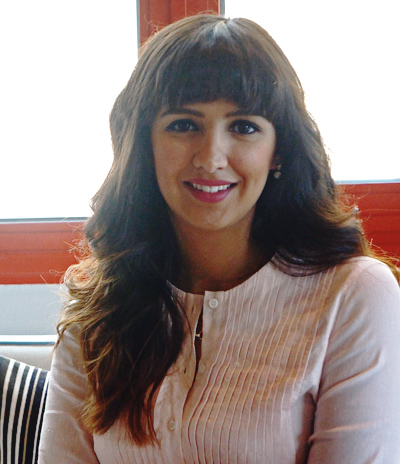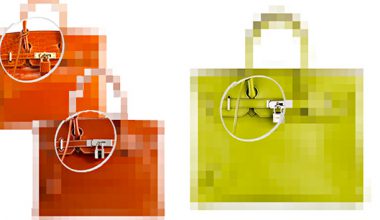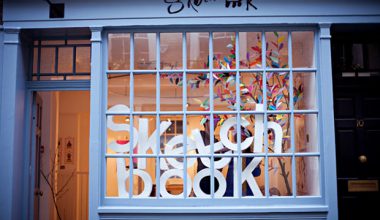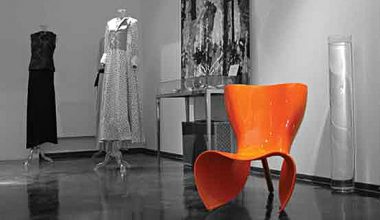Taiba Al Humaidhi, owner and Managing Partner of BTZ group, discovered Silsal, a Jordanian ceramic pottery franchise, online, when she was looking for a Girgai’an idea for her son. Inevitably, she fell in love with the brand, and about three months later, Silsal was in Kuwait.
Khaleejesque met with Taiba to chat about the BTZ group that manages the Kuwaiti Silsal franchise and their own local concept, Karrasi, where they design modern chairs that cater to your personal taste. The word itself is Arabic for "chairs." We might not understand the technical aspects of ceramic or chair making, but we’re sure of one thing: Arabic inspired pottery and furniture never looked this contemporary.

Tell me about yourself and where you stand in terms of the BTZ group.
My two sisters (Badriya and Zaina) and I own the company. They all have day jobs, but I’m 100 percent dedicated to the company itself. The company was established in 2007 and we started with a brand called Karrasi, which is dedicated completely to designing chairs, stools, benches, and sofas. Badriya is the designer and we’re managing it.
We introduced Silsal in Kuwait in 2009. There’s also a Silsal distributor in Saudi and Oman and the British Museum also sells Silsal (we have a line for them). You’ll hear about it opening in other countries soon. It started with ceramics and home accessories and later branched into furniture. For the time being, the furniture only includes tables and wall installations. The furniture is usually made out of wood and fiberglass, but will be branching out using new materials like glass, plexi and wood incorporated with ceramics.
How did you dive into this?
I studied in Boston for three years, but graduated from the American University of Kuwait with a BA in business administration and management. After graduation, I worked in the public relations department at Zain Telecom for a year and a half, and then had my first baby. That meant I couldn’t do the 8 AM – 4 PM hours. Public relations is actually a 24-hour job. It was too hectic for me so I decided to quit. At the time, BTZ was established, but it didn’t consume that much time, so I decided to start expanding it instead of going slowly.

Silsal is a Jordanian concept and Karrasi is a local (Kuwaiti) concept. Tell us more about each one.
Silsal has been established for 25 years. Two Jordanian women started it as a hobby, but also approached it with a corporate social responsibility initiative. They hired an older Jordanian generation who were illiterate and unemployed, but perfected calligraphy. It wasn’t modernized or functional, but more “antiquey,” and American tourists would buy one or two pieces. After 20 years, their daughter, who is a creative designer for Silsal, came over and studied ceramic design, and she brought in the modern theme and functionality, and that’s exactly when we joined them. Silsal has a new line every year, a new concept, so it’s always evolving.
As for Karrasi, we do have exhibitions where we have a few pieces, but it’s mainly by commission. They have the same spirit; they complement each other, but its not part of Silsal. We can create something for you to match your living room, so it complements your table, for example. It’s a piece where it would make a bland living room pop! We are in the process of updating the website where it will have Karassi pieces that we have already produced and sold, and the pieces we’ve been commissioned to do.
How do the Karassi pieces stand out, and what makes them different?
My sisters and I have completely different personalities in style and state of mind, so it takes a very long time to sit down and discuss it. Badriya is very corporate and professional, so she brings in the modern twist with functionality. I’m the mother with kids, so I know what a mother would look for when she has people over. Zaina is the youngest, so she brings in what’s stylish. Everyone comes in with a different perspective so we feel that’s what we bring to the table. Once the three of us agree that it’s a beautiful piece, that’s when we present it to the customer and alhamdulillah, they love it! If you have a design, we’ll try to implement it for you, or you can have us see your living room and we produce whatever you want. We mainly use wood, but our last collection mainly consisted of leather.

Where does most of the inspiration come from?
I’m not a very creative person, and when you move out of your own space, you become hesitant and not confident with your own taste and style because you’re leaving a house where everything is done for you. When it’s your space, you want to bring in your own style to the house. When I first started with my house, there were many similarities between my parent’s house and my house and I figured out that it’s not what I like, or what fits my personality or my husband’s and kids’ personalities. Slowly, you filter it out and start to take the risk of applying your own style because at the end of the day, it’s what you’ll sit and look at, so you have to like it.
How would you describe your personal style in interior design?
I’m more contemporary with feng shui and modern Arabic art. Functionality comes before style because I have kids and it’s very hard for me to do this type of work in my house at the current time. I do have one living room that’s off perimeters to my kids; it has a contemporary look with pieces that stand out.

Where does the Arab world fit in with the designs?
When we were in high school, we hated Arabic class. I’m ashamed of my Arabic handwriting; it’s horrible! But I liked it as an art, so when I saw the pieces in Silsal, I felt like it’s our culture. We’re going out and are impressed with Japanese and English calligraphy, but Arabic [Islamic] calligraphy is gorgeous! I started to fall in love with Arabic calligraphy, and I liked Silsal’s concept because it’s trying to maintain the heritage of Arabic calligraphy when it’s slowly fading. We want people to see the beauty of it and you never know, someone might take the time to learn it. Foreigners are mesmerized with it and it blows them away; I want our reaction to be their reaction! It’s happening, but Kuwaitis are very picky, and it’s challenging, but I love it. You have to give them something that really captures them.

Is it true that each piece is one-of-a-kind?
In Jordan, the King has a customized Silsal line made exclusively for him that we don’t replicate. We do a lot of corporate gifts. Last year, we partnered with Al Yasra group and made a beautiful gift; they had the different types of teas they sell and our cups to match. We also made gifts for Loyac’s sponsors, and this year we’re doing more corporate work.
There are concepts we do in Kuwait that are not done in Jordan. For example, we make the date and sesame dip (harda) dip bowl that some people even use as a labna and olive bowl. That’s the beauty of it: you can use the piece for whatever you want because it’s functional! We also have “mabakhir” (incense burners) that are exclusively for Kuwait. Everything is based on demand.
What seems to be popular in Silsal?
Food dishes and gifts. People are into chocolate plates more than flowers. A lot of people order bridal gifts and Girgai’an gifts. They come in and they get that done here. It’s nice, it’s personal and it’s not over anyone’s budget.
How do you assure to create beautiful yet functional pieces?
A lot of people are hesitant to use these plates everyday because they look so delicate, but like every other china, they’re microwave and dishwasher safe. I use my Silsal mugs every single day! We like to emphasize that it’s functional and useful.

Are you ever afraid of ruining the ceramic theme by incorporating glass and wood?
There is always ceramic in it. If the table is made of wood, there is a ceramic piece in it. We try to stick to where we started, but generally people appreciate it. You can’t make everything out of ceramics — it’s unrealistic. You can’t make a whole table out of ceramics! Some people request glass tea sets and we listen to what our customers want.
What are some of the challenges you have faced?
We were very lucky to be franchising with Silsal because they’re extremely helpful when it comes to franchising. I’ve heard horror stories about franchises, but we’re very comfortable with ours. My challenge is not from abroad, it’s in Kuwait! Every small business faces challenges with locations and paperwork. It’s time consuming, boring, inappropriate, and inconvenient. There are helpful people, but the process is just hectic. It could be much better and I don’t expect much support, and you’d expect private companies to support young people in their maturing businesses, but you’re actually on your own. There are also those customers who have unrealistic deadlines and once we don’t deliver on time, they go crazy. But they’re just looking out for their best interest. It’s business.

What are your thoughts on young and local entrepreneurs like yourself?
BTZ loves to support local business — we do gifts like plexi glasses for them. We’re very proud of young Kuwaitis and proud of ourselves because we’ve come a long way. We’d like to help out others so they can avoid going through what we went through. We have recently collaborated with the local chocolate creations of Kakao by Nada Al-Yoan. We’re working with them this Ramadan. Silsal does the chocolate bowls and plates. We’re trying to keep relationships alive through small businesses.
Speaking of Ramadan, what do you have planned for this year?
We constantly participate in exhibitions. This year, we have two: White Expo at 360, and Beccare, a contemporary Kuwaiti-themed gallery in Salmiya. We will be selling our Silsal ceramics and furniture (tables) in Beccare.
Any future plans?
For Silsal, we will hopefully be available somewhere more accessible, and you will find us somewhere closer to you. There are new concepts that are not furniture related, but the hold the same idea. We will be creating restaurant dishes, but it’s still an ongoing project.
We are currently expanding the furniture line with glass, which will be introduced after Ramadan, because we’re in the beginning phase of testing and production. As for Karrasi, we’re trying to come up with a new line to incorporate calligraphy, but that’s taking us longer than expected because we were trying to outsource the fabrics.
– Iqbal Al Sanea
Images courtesy of BTZ Group








